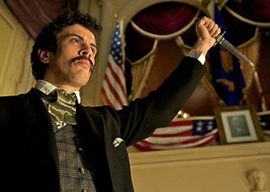
April 20, 2011

Robert Redford’s courtroom drama The Conspirator recounts the 1865 trial by a military tribunal of Confederate partisan Mary Surratt for her murky role in John Wilkes Booth’s plot to murder Abraham Lincoln. Redford obviously intends his movie as a parable denouncing George W. Bush’s employment of military tribunals instead of jury trials for Guantanamo Bay prisoners.
However, Barack Obama’s March 7, 2011 decision to abandon his campaign pledge and resume Guantanamo tribunals took the wind out of Redford’s sails. Whenever Obama does something he had previously denounced Bush for doing, such as starting a war in the Middle East, the media glumly attempt to impose a no-fly zone over the topic and dutifully divert attention elsewhere.
Conspiracy theories have been out of fashion since Oliver Stone’s JFK. Yet like 1914’s assassination of Austro-Hungarian Archduke Franz Ferdinand in a plot the head of Serbian military intelligence organized, Lincoln’s murder and the simultaneous attack on Secretary of State William Seward required a sizable conspiracy. The most important question remaining today is whether the actor improvised. Or did culpability go all the way to the top of the Confederacy, perhaps in revenge for Union colonel Ulric Dahlgren’s attempt to kill Jefferson Davis in his 1864 raid on Richmond?
Television writer James D. Solomon’s stodgy screenplay harkens back to the earnest middlebrow dramas that dominated the legitimate stage in the 50s such as The Crucible, Inherit the Wind, and other didactic plays beloved by high-school drama teachers.
Still, The Conspirator is of considerable interest, both for its cast’s quality and because the 74-year-old Redford seems to have no idea how unfashionable his view of post-Civil War history has become since he arrived on the New York stage in the late 1950s. The Conspirator reflects the anti-Republican prejudice endemic in history textbooks when Redford was in school. To imply that 21st-century Republicans are deluded by Islamophobia, Redford argues that 1865’s Republicans were crazed by Confederophobia.
Oops.
James McAvoy, the immensely likable young Scottish actor who played the furry-legged Mr. Tumnus in the first Chronicles of Narnia, stars as inexperienced lawyer Frederick Aiken. This Union war hero is forced into defending the widow Surratt, owner of the boardinghouse where Booth and his cohorts schemed.